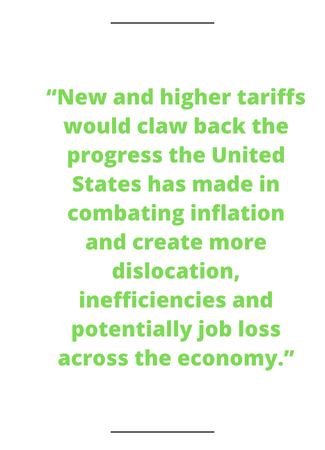Update: On December 26, the office of the U.S. Trade Representative (USTR) announced a further extension of “Section 301” tariff exclusions on 352 Chinese import and 77 COVID-19-related categories until May 31, 2024.
- The USTR also announced the opening of a docket for public comments on existing exclusions on January 22, 2024.
PPAI has joined Americans for Free Trade, a broad coalition of hundreds of organizations representing U.S. businesses, trade organizations and workers united against tariffs, in requesting the United States Trade Representative (USTR) extend the tariff exclusions and COVID exclusions from the Section 301 tariffs on products from China.
- The exclusions were initially set to expire on December 31.
- A four-year tariff review has been conducted by the USTR, but the conclusions and determinations of the review have not been announced.
The China 301 Tariffs
In 2017, the USTR conducted an investigation concerning China’s trade practices, concluding that the country was guilty of several practices deemed suspicious or unfairly burden the U.S. This type of investigation and subsequent action is allowed under Section 301 of the Trade Act of 1974.
- As a result, tariffs were placed on products that are exported from China.
- In other words, additional taxes were placed on U.S. businesses that choose to do business with China.
- This measure is meant to disincentivize U.S. trade with China, punishing it for unfair trade practices but ultimately creates inconveniences and unavoidable financial burdens on many U.S. companies.
In the past five years, American companies have paid more than $198 billion toward Section 301 China tariffs according to the USTR.
The USTR has conducted a four-year review of the Section 301 China tariffs.
- Results or a conclusion regarding this four-year review have not been released or announced, despite the eager interest of many affected parties.
“We urge USTR to conclude the four-year review expeditiously and announce the outcomes before the end of the year,” the letter by the Americans for Free Trade reads. “The broader stakeholder comment period has been closed for almost a year now. Americans for Free Trade and the hundreds of organizations who commented about the continuing negative impact of the tariffs need to know the results to ensure they have certainly and predictability in their supply chains.”

Tariff Exclusions (Potentially Coming To An End)
When the Section 301 tariffs were placed, businesses had a window in which they could request specific products be excluded from the tariffs. Assuming valid evidence was provided, those products would receive exclusion from having to pay the taxes.
- These exclusions are not permanent.
- As exclusions expire, individual businesses and corporations can request extensions for the exclusions.
- Often, determinations by the USTR regarding exclusion extensions are not granted until exclusions are days away from expiring, leaving businesses unsure of whether they will have to pay tariff taxes on products they may need to conduct their operations.
The current exclusions to Section 301 China tariffs are set to expire May 31, 2024.
“The pattern of making last-minute announcements regarding the tariff exclusions exacerbates uncertainty for U.S. companies who need to make business decisions months in advance,” the Americans for Free Trade letter says.
Earlier today, we sent a letter to @USTradeRep urging an immediate extension of the China 301 #tariff exclusions that are set to expire on Dec. 31 and publish the results of the four-year review – https://t.co/8xsCVDtDM7. #TariffsHurt #TariffsareTaxes
— Americans For Free Trade (@Americans4Trade) December 12, 2023
PPAI And Others Sign Letter
Americans for Free Trade’s letter requests that the exclusions to the Section 301 China tariffs be extended immediately.
- It also contends that it is unreasonable to expect companies to have to wait until the deadline nears before knowing if exclusions will be extended, especially when concerning products that cannot be sourced anywhere but China.
PPAI has chosen to sign the letter to the USTR along with hundreds of other American organizations. A few other signatures include:
- American Trucking Association
- Coalition of Service Industries
- Global Business Alliance
- National Retail Federation
PPAI’s public affairs manager, Maurice Norris, notes that the Association requests that the exclusions be extended but is also on the record asking for a “comprehensive and transparent exclusion process.”
- It is PPAI’s opinion that it is impractical for promo companies to adjust if the USTR makes next steps regarding the tariffs by the end of the month considering the time crunch and the amount of planning required to import products from China.
Still, the letter makes clear its belief that failing to extend the exclusions will do significant damage to individual companies and the economy at large.
“New and higher tariffs would claw back the progress the United States has made in combating inflation and create more dislocation, inefficiencies and potentially job loss across the economy,” says the letter.


